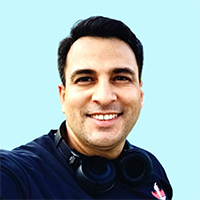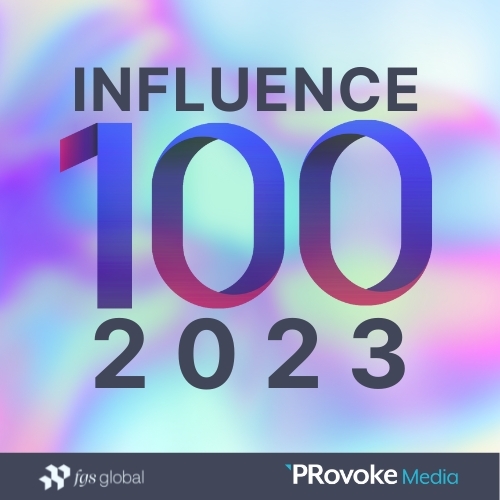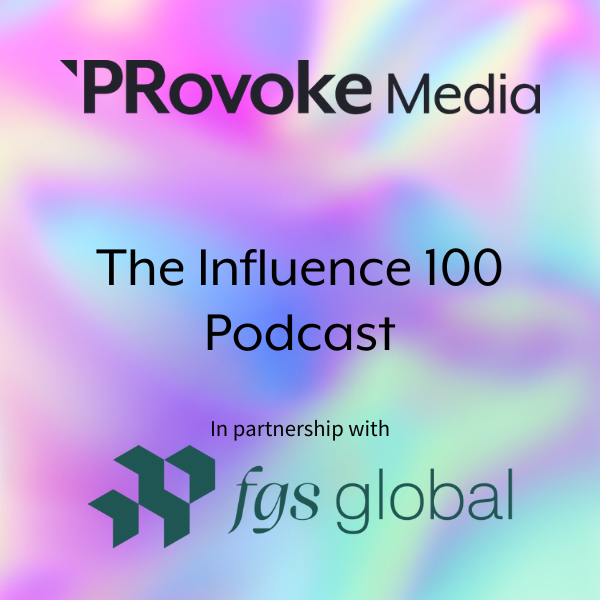
 Podcasts
PodcastsCatch the latest PR news & updates with PRovoke Media's PR Podcasts. Lifting the lid on key industry stories & trends, join our listeners of PR podcasts today.
 Videos
VideosLatest video interviews and campaigns from PRovoke Media, previously known as the Holmes Report.
Long-form journalism that analyzes the issues, challenges and opportunities facing the business and practice of PR.
 Profiles & Interviews
Profiles & InterviewsExplore PR profiles and interviews with leaders from the marketing and PR worlds.
 Crisis Review
Crisis ReviewPR Crisis & Business Crisis review. PRovoke Media's annual analysis of the top reputation crises to rock the corporate sector. Read on here.
 Coronavirus
CoronavirusPRovoke Media's coverage of the Covid-19 crisis, focusing on corporate communication, public affairs & PR industry fallout.
 Trend Forecasts
Trend ForecastsPRovoke Media's PR Trends round up. PRovoke Media's annual forecast of PR trends and news that will impact the PR world in the year ahead...
 Social & Digital
Social & DigitalDedicated to exploring the new frontiers of PR as it dives deeper into social media, content and analytics.
 Technology
TechnologyOur coverage of key technology PR trends and challenges from around the world of digital communications.
 Consumer
ConsumerFrom brand marketing to conscious consumerism, coverage of key marketing and PR trends worldwide.
 Employee Engagement
Employee EngagementPRovoke Media's coverage, analysis and news around the rapidly-shifting area of employee engagement and internal communications.
 Sports Marketing
Sports Marketing Sports PR news, diversity & inclusion trends, views and analysis from PRovoke Media. Subscribe today for the very latest in the world of sports communications.
 Global PR Agency Rankings
Global PR Agency RankingsPRovoke Media's definitive global benchmark of global PR agency size and growth.
Enter PRovoke Media's 2024 Global 250 Agency Ranking and/or our Agencies of the Year competitions now.
 Agencies of the Year
Agencies of the YearPRovoke Media's annual selections for PR Agencies of the Year, across all of the world's major markets.
 Innovator 25
Innovator 25PRovoke Media profiles marcomms innovators from across North America, EMEA and Asia-Pac.
 Creativity in PR
Creativity in PRIn-depth annual research into the PR industry's efforts to raise creative standards.
 Asia-Pacific Communication Index
Asia-Pacific Communication IndexAPACD/Ruder Finn annual study of Asia-Pacific in-house communications professionals.
 SABRE Awards
SABRE AwardsThe world's biggest PR awards programme, dedicated to benchmarking the best PR work from across the globe.
 PRovokeSummit Global
PRovokeSummit GlobalThe biggest PR conference of the year, a high-level forum designed to address the critical issues that matter most.
 PRovoke Media Regional Series
PRovoke Media Regional SeriesA global network of conferences that explore the innovation and disruption that is redefining public relations.
 Agencies of the Year
Agencies of the YearUnrivalled insight into the world's best PR agencies, across specialist and geographic categories.
 Roundtables
RoundtablesOur Roundtables bring together in-house comms leaders with PR firms to examine the future of communications.
 Agency Playbook
Agency PlaybookThe PR industry’s most comprehensive listing of firms from every region and specialty
.jpg) All Jobs
All JobsFind the latest global PR and communications jobs from PRovoke Media. From internships to account executives or directors. See all our PR jobs here.
PRovoke Media's editorial series published in collaboration with partners.

This year marks a hat trick (as they say in the cricket world) for Abhinav Kumar, who is on the Influence 100 list for the third year in a row. Highly creative yet organized, strategic with a sharp eye for detail, and a consummate (and engaging) networker, Kumar lives by the rule that ‘the most important decision you make any day is how you allocate your time’. He seems to have managed his very effectively – he was elevated to his current role as chief marketing and communications officer for global markets at the start of 2018, after previously serving for six and a half years as Tata Consultancy Services’ CMCO for Europe. Under his leadership, TCS' brand value has risen from US$2.3bn in 2010 to US$17.2bn in 2023.
Kumar has now spent 21 years with TCS, joining the company in India before leading marketing and communications for its Latin American operations, based in Uruguay and then Chile. In 2008, he relocated to Europe and has been based in Brussels since. He now heads up marketing and communications for all international markets, including North America, Europe, UK, Latin America, APAC and MEA, managing a team of regional CMOs and global function heads for communications, branding, operations and sponsorships. With a US$350m deal portfolio, TCS sponsors 14 marathon properties worldwide, including adding the iconic TCS London Marathon and TCS Toronto Waterfront marathon to its repertoire in 2022, and made a foray into motorsports with the Jaguar TCS racing team, which participates in the Formula E – electric car racing circuit.
As part of the global senior management team, Kumar serves as official spokesperson for the company and represents TCS and the wider Tata Group with European governments and institutions in Brussels. He has also been the driver of TCS’ strategic partnership with the World Economic Forum since 2009, which sees a compelling brand presence for the company at Davos.
Kumar’s work at TCS has resulted in several awards – including a SABRE award for individual achievement in 2019 – as he has successfully shifted the company’s approach towards more creative, integrated and effective campaigns, which have also helped underpin its rise into one of the world's largest IT services firms, one of the fastest-growing companies and the second most valuable brand in its sector.
Can you share a moment in your career when you saw PR’s direct impact on business performance
There is a famous quote in one of Ernest Hemingway’s novels: when a character is asked how he went bankrupt, the response is: “Two ways. First gradually, then suddenly.” Applied in a more positive context, that’s exactly how PR/communications works. To build the story, positioning and central narrative of your brand, you need to consistently work on it for a long time. While this consistency is essential, there will also be moments when you can greatly uplift your brand through taking advantage of opportunities and by applying creativity. It important for PR teams to understand and work on this duality: keep great consistency, as well as surge and rise to the occasion when needed.
If I look across my 21-year career with TCS, for most of it we have maintained a steady stream of PR performance, being ranked top three consistently in our industry for share of voice. There have been innumerable occasions where our teams have managed to move the needle for our business: each occasion, when communicated right, helped us shift perceptions progressively. For example, this year we did exceptional PR around our Formula E team, Jaguar TCS racing, and in Latin America towards the expansion of our operations in Mexico. If you ask me how we built our brand from 33% to 84% awareness levels and add over $15 billion of brand value over the last decade, my answer would be: “Two ways. First gradually, then suddenly.”
What are the communications industry’s biggest challenges and opportunities in the year ahead?
This is definitely the year that artificial intelligence came alive, and front and center of all dialogues and experimentation in our profession; 45% of all companies are already using AI towards developing content and Gartner estimates that by 2025, 30% of all outgoing communications by companies will be AI-enabled. As a previously enterprise and predictive technology, which is fast becoming consumerized and generative, AI holds great potential for the comms function on many fronts – stakeholder engagement, content creation, human representation by digital avatars, deep insights – and at the same time it contains many risks, from regulatory and IPR issues to growing misinformation and cyber threats.
What have you most admired about the communications industry over the past year, and what has disappointed you?
The communications function was one of the most burnt out functions after the pandemic. One survey reported 77% burnout rates in the profession, second only to HR professionals. Yet over the past year, since the reopening of everything, the profession has thrived and continued to build narratives, capability and relevance in a time of poly-crises, from geopolitical conflicts, to economic uncertainty to deeply divisive social issues. The profession has shown itself to be resilient and gaining more strategic space inside all organizations. In terms of disappointment, the longstanding issue of having a common standard of measurement to showcase the value the profession brings remains a gap area, and the profession has not done enough to rally around a standard.
What work from your team are you most proud of over the past year?
Our teams worldwide are doing some phenomenal work. One of the most high-impact and highly-engaging pieces of marketing and communications work we do is around our growing sports portfolio of marathon and running properties, to which we added the TCS London Marathon and TCS Toronto Waterfront marathon last year. Also the work that our teams have done in the Formula E racing team we run along with JLR, the Jaguar TCS racing team, has been very compelling in engaging our client and partner communities worldwide, from tradeshows to some of our client events.
How have you switched off from work and maintained wellness over the past year?
To be contrary, I think after 2.5 years of the pandemic, the last 14 months have been a period to switch on. Along with relaunching our entire suite of physical events and engagement, from Davos to tradeshow to client events, I have travelled extensively in this period to reconnect with clients, partners and colleagues worldwide. The human contact has been very energizing, but of course it’s important to keep a balance and focus on wellness, so I choose very carefully what I invest my time on and ensure I am giving enough time to my family and kids, and to myself too for learning and disconnecting.
Which book/movie/TV show/podcast/playlist/other cultural source has helped you get through the past year or provided inspiration?
I strongly recommend reading ‘Why We Sleep’ by Matthew Walker, it’s an eye-opener on the power of sleep and its inimical linkage with health and wellness. Reading it will literally change your life, for the better, and see you make a more concerted effort to hit your pillow adequately.
If I wasn't working in marketing/communications, I would be...
My answer remains unchanged from last year! In an alternative metaverse, it would be an honor to work in aerospace or as a climate scientist. I greatly admire people in both these professions. For the continuity of life, we need to either protect our planet better, or find new ones to live on. I hope we do both.




Intelligence and insight from across the PR world.
About PRovoke Media Contact Us Privacy & Cookie PolicyWe feel that the views of the reader are as important as the views of the writer. Please contact us at [email protected]
Signup For Our Newsletter Media Kits/Editorial Calendar Jobs Postings A-Z News Sitemap© Holmes Report LLC 2024